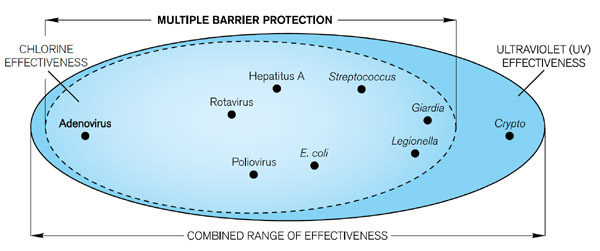Bacteria in Water
What’s scarier than being told your tap water is unsafe to drink? Your city has alerted you there is bacteria in water. Or a virus, etc.
Each year 10,000’s of people are told to boil their water. Sometimes there is actual proof for bacteria in drinking water. Other times, there could just be a high risk. Either way, it’s no fun.
So what actually puts your water at risk? What can you do about it?
Risks for Bacteria in Drinking Water
Your drinking water quality can be compromised in several ways. A lot depends on the source of your water.
Surface Water Runoff
If you get water from a lake or river, there is little protection to your water supply. Runoff after heavy rains can wash fertilizer or feces into the water supply. City water is chlorinated as a safeguard. But sometimes that’s not enough.
City Water Main Breaks and Leaks
10% or more of city water is lost due to leaks in water mains. Each leak is an opportunity for microbes to enter your water supply. This happens BETWEEN the water plant and your home.
Private Well Contamination
Contaminants can enter a private well if the well head or casing develops a crack. Private wells are not typically chlorinated like city water. This means any bacteria is given a free pass.

How to Kill Bacteria in Water
There are several methods to control bacteria and virus in water. Here are the most common:
Chlorine Injection
Chlorine is not effective against all bacteria, virus, or cysts. But it does a good job on most of them.
Most cities put chlorine in water to kill bugs. Garrelts Water has an Iron Filter System that acts like a small “city water plant”. Chlorine is continually injected into the water to kill bacteria. This system is effective, but does give water a chemical taste and smell. Chlorine may also dry or irritate skin. This can be fixed by adding a carbon filter after the chlorine injection system.
Ultraviolet (UV)
A UV Water Purifier is a powerful tool to kill bacteria in water. UV is effective against just about every microbial risk. It consumes very little energy, and does not add any chemical taste or smell. They make sense for every private well.
UV systems are even good for city water. They add a layer of protection against virus tor cysts hat chlorine has limited effect on.
Boiling Water
Has your city issued a boil order? Boiling water can kill bacteria, if you do it right. People are often surprised to learn that you need to boil water for 20 minutes or more to be effective. While this approach is free, its not always effective.
